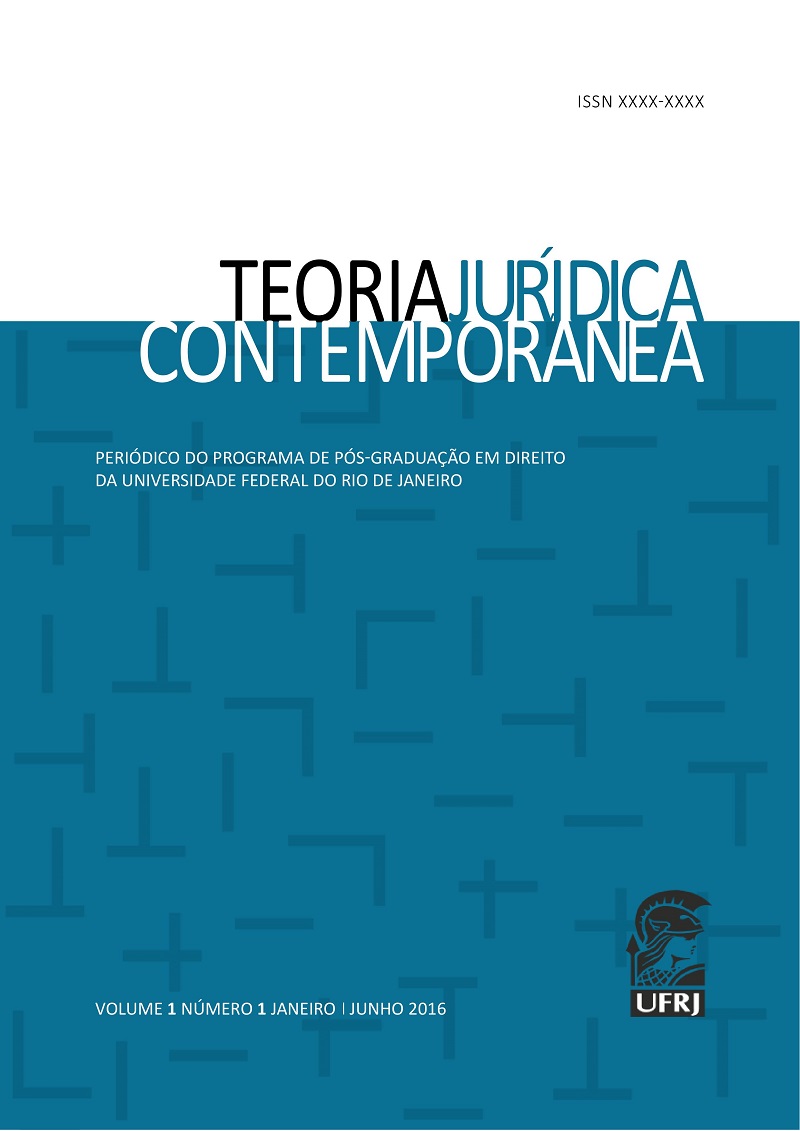Judicial Deliberations: uma resenha crítica
DOI:
https://doi.org/10.21875/tjc.v1i1.3415Keywords:
Direito comparado, Legitimidade, Transparência, Mitchel Lasser, Deliberações judiciais, Comparative Law, Legitimacy, Transparency, Judicial DeliberationsAbstract
Resumo: Mitchel Lasser, em sua aclamada obra Judicial Deliberations: a comparative analysis of judicial transparency and legitimacy (2009), oferece uma análise comparativa de três tribunais: a Corte de Cassação francesa, a Suprema Corte americana e a Corte Europeia de Justiça. Seu principal foco é mostrar que a visão comparatista tradicional, que ele atribui a autores como Dawson e Merryman, não corresponde à realidade. Lasser compara as práticas argumentativas e deliberativas dos três tribunais e as consequências que essas práticas têm sobre dois elementos: transparência e legitimidade. Pretendo argumentar que, mesmo que aceitemos as descrições que Lasser faz de cada um dos sistemas jurídicos, a falta de clareza em torno desses conceitos (legitimidade e transparência) dificultam a avaliação de alguns dos argumentos centrais da obra. Por fim, as evidências apresentadas a respeito de algumas das afirmações do livro não parecem suficientes.
Abstract: Mitchel Lasser, in his acclaimed Judicial Deliberations: a comparative analysis of judicial transparency and legitimacy (2009), offers a comparative analysis of three courts: the French Cour de Cassation, the US Supreme Court and the European Court of Justice. His focus is to question the accuracy of the traditional American comparative view, which he identifies in the works of Dawson and Merryman. Lasser compares the argumentative and deliberative practices of the three courts and the consequences that those practices have over two elements: transparency and legitimacy. I intend to argue that, even if we accept Lasser's description of each judicial systems, his lack of clarity regarding those concepts (legitimacy and transparency) makes it difficult to evaluate some of his central claims. Finally, some of the claims advanced in the book do not seem to follow from the evidences the author presents.
Downloads
References
FRIEDMAN, B. The Counter-Majoritarian Problem and the Pathology of Constitutional Scholarship. Northwestern University Law Review, v. 95, nº 3, p. 933-954, 2001.
KOMÁREK, Jan. Questioning Judicial Deliberations. Oxford Journal of Legal Studies, v. 29, nº 4, p. 805-826, 2009.
KOTZ, Hein. Scholarship and the Courts: A Comparative Survey. In: CLARK, D. S (ed.). Comparative and Private International Law: Essays in Honor of John Henry Merryman on His Seventieth Birthday. Duncker & Humblot: Berlin, p. 183-195, 1990.
SCHAUER, Frederick. Playing by the Rules: A Philosophical Examination of Rule-Based Decision-Making in Law and in Life. Oxford: Oxford University Press, 1991.
SCHAUER, Frederick. Formalism. The Yale Law Journal, Vol. 97, Nº 4, p. 509-548, 1988.
SUNSTEIN, Cass. Must Formalism be Defended Empirically? John M. Olin Law & Economics Working Paper, n. 70, University of Chicago Law School, 1999 disponível em: http://www.law.uchicago.edu/files/files/70.Sunstein.Formalism.pdf. Acessado em: 30 junho 2016.
TUSHNET, Mark. Taking the Constitution Away From the Courts. Princeton University Press, 1999.
LASSER, Mitchel S. -O. -L'E. Judicial Deliberations: A Comparative Analysis of Judicial Transparency and Legitimacy. Oxford: Oxford University Press, 2009.
WALDRON, Jeremy. The Core of the Case against Judicial Review. The Yale Law Journal, v. 115, nº 6, p. 1346-1406, 2006.
Downloads
Published
Issue
Section
License
The authors who publish in this journal agree with the following terms:
1. The authors maintain the copyright and grant the journal the right of first publication, with the work simultaneously licensed under the Creative Commons Attribution License that allows the sharing of the work with recognition of authorship and initial publication in this journal.
2. Authors are allowed to assume additional contracts separately, for non-exclusive distribution of the version of the work published in this journal (e.g., publishing in an institutional repository or as a book chapter), with acknowledgment of authorship and initial publication in this journal.
3. Authors are allowed and encouraged to publish and distribute their work online (e.g., in institutional repositories or as a personal page) at any point before or during the editorial process, as this may generate productive changes, as well as increase the impact and citation of the published work (See The Effect of Open Access).

This work is licensed under a Creative Commons Attribution-ShareAlike 3.0 Brazil License.

